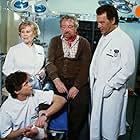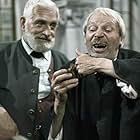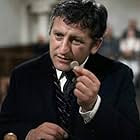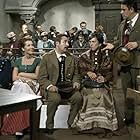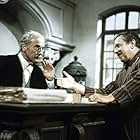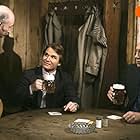Browse episodes
Storyline
Did you know
- GoofsDuring the opening credits, after about 40 seconds, for a short moment a modern car can be seen in the lower left corner of the screen near the fountain.
- ConnectionsFeatured in SchleichFernsehen: Episode #1.1 (2011)
Featured review
This is an entirely local affair and it is as doubtful that you'll ever find this outside the Bavarian TV-program as it is doubtful that a non-Bavarian would comprehend much, and be it only because of the "language-barrier" (the entire show is performed in Bavarian dialect). However, if you wish to gain an insight into the Bavarian culture and mentality, "Königlich Bayerisches Amtsgericht" is as archetypal Bavarian as White Sausage, drinking beer from bucket-sized glasses ("a Mass") or (his royal highness and sovereign) King Ludwig II.
The show takes place in "the good times before 1914"; the land is ruled by Prince regent Luitpold (because King Otto was suffering from "heavy moods", as the narration assures us; it's a euphemism for stark-raving mad). All episodes take place in the same rural court-room and each trial concerns rather mundane or petty crimes. Such as an atheist trying to convince others that man has descended from apes ("Der Atheist"), a parasitic "prayer-brother" (who illegally does your prayers for you in exchange for cash) who sneezes on other peoples food in order to get a free meal ("Der Parasit") or somebody accusing the local pharmacist of being a poisoner because he got sick from a medicine that was meant for somebody else ("Die Vergiftung"). None of these trials are meant to be taken serious, although one could imagine that most of them are based on real cases from this time.
The average Bavarian prides himself, among other "virtues", of being descendant from farmers and hence consider themselves "Bauernschlau" ("clever like a farmer") and being "down-to-earth" (witty, stubborn, having a good humor, laid back yet having an easily excitable temperament, etc); in other words: if you want to know how the average Bavarian would like to see himself, you need only watch an episode of "Königlich Bayerisches Amtsgericht". If you should ever visit a rural part of this country (since Bavaria considers itself independent despite better knowledge), you might find characters that are not very far removed from those depicted in the show – and yes: many will still wear the same traditional cloth ("Tracht").
Speaking about the actors: regulars like Fritz Straßner, Gustl Bayrhammer, Erni Singerl, Max Grießer, Veronika Fitz or Karl Obermayr (to name but a handful), all belong to the crème de la crème of (South)-German film and TV, many of whom have since sadly passed away and are considered irreplaceable.
As for the goofs: it is of course true that for an instant there is a modern car visible in the background of the opening. However, during a conversation I have been assured by a fan of the show that this is impossible, because "there were no modern cars in 1912". This too is part of Bavarian mentality.
Modern car or not: 10/10 for what it is.
The show takes place in "the good times before 1914"; the land is ruled by Prince regent Luitpold (because King Otto was suffering from "heavy moods", as the narration assures us; it's a euphemism for stark-raving mad). All episodes take place in the same rural court-room and each trial concerns rather mundane or petty crimes. Such as an atheist trying to convince others that man has descended from apes ("Der Atheist"), a parasitic "prayer-brother" (who illegally does your prayers for you in exchange for cash) who sneezes on other peoples food in order to get a free meal ("Der Parasit") or somebody accusing the local pharmacist of being a poisoner because he got sick from a medicine that was meant for somebody else ("Die Vergiftung"). None of these trials are meant to be taken serious, although one could imagine that most of them are based on real cases from this time.
The average Bavarian prides himself, among other "virtues", of being descendant from farmers and hence consider themselves "Bauernschlau" ("clever like a farmer") and being "down-to-earth" (witty, stubborn, having a good humor, laid back yet having an easily excitable temperament, etc); in other words: if you want to know how the average Bavarian would like to see himself, you need only watch an episode of "Königlich Bayerisches Amtsgericht". If you should ever visit a rural part of this country (since Bavaria considers itself independent despite better knowledge), you might find characters that are not very far removed from those depicted in the show – and yes: many will still wear the same traditional cloth ("Tracht").
Speaking about the actors: regulars like Fritz Straßner, Gustl Bayrhammer, Erni Singerl, Max Grießer, Veronika Fitz or Karl Obermayr (to name but a handful), all belong to the crème de la crème of (South)-German film and TV, many of whom have since sadly passed away and are considered irreplaceable.
As for the goofs: it is of course true that for an instant there is a modern car visible in the background of the opening. However, during a conversation I have been assured by a fan of the show that this is impossible, because "there were no modern cars in 1912". This too is part of Bavarian mentality.
Modern car or not: 10/10 for what it is.
- t_atzmueller
- Jan 26, 2014
- Permalink
Details
Contribute to this page
Suggest an edit or add missing content

Top Gap
What is the English language plot outline for Königlich Bayerisches Amtsgericht (1969)?
Answer










